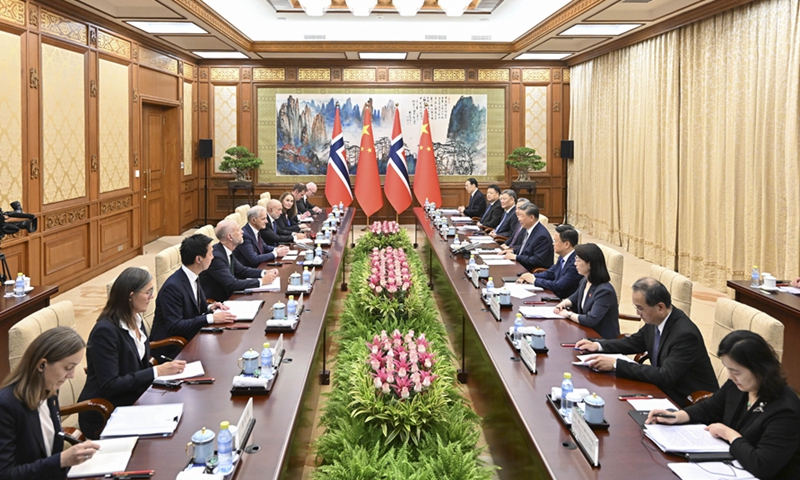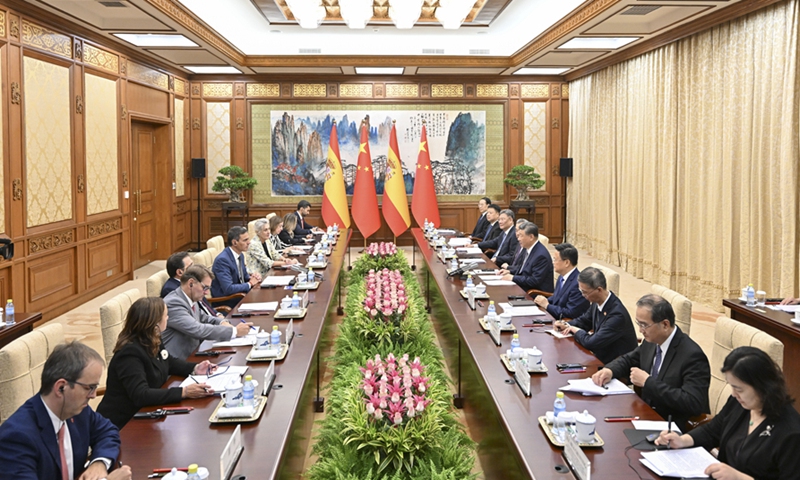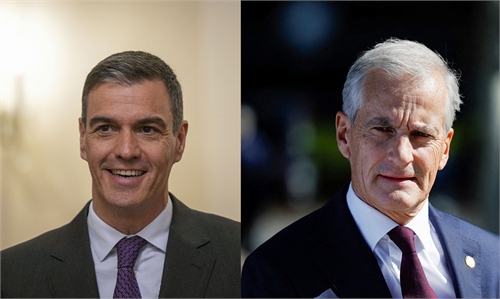
Chinese President Xi Jinping meets with Norwegian Prime Minister Jonas Gahr Store, who is on an official visit to China, at the Diaoyutai State Guesthouse in Beijing, capital of China, Sept. 9, 2024. (Xinhua/Yin Bogu)

Chinese President Xi Jinping meets with Spanish Prime Minister Pedro Sanchez, who is on an official visit to China, at the Diaoyutai State Guesthouse in Beijing, capital of China, Sept. 9, 2024. (Xinhua/Yin Bogu)
Chinese President Xi Jinping on Monday met separately with visiting Norwegian Prime Minister Jonas Gahr Støre and Spanish Prime Minister Pedro Sanchez at the Diaoyutai State Guesthouse in Beijing.
Such high-level interactions not only underscore the joint efforts between China and the European countries to address challenges and maintain stable relations amid frictions and differences, but also show their strong commitment to seeking cooperation and mutual benefits amid an evolving global landscape, analysts said.
Xi told Støre that China is ready to work with Norway to promote the continuous development of friendly cooperation.
Furthering China-Norway friendly cooperation is consistent with the will of the two peoples, the fundamental interests of the two countries, and a global trend of maintaining closer ties among countries to share weal and woe, Xi said.
Xi noted that today's world is undergoing profound changes unseen in one century, which are testing whether the international community can make the right choice, the Xinhua News Agency reported on Monday.
When meeting with Sanchez, Xi pointed out that China and Spain celebrated the 50th anniversary of the establishment of diplomatic ties last year, and that the two sides have since maintained close exchanges and interactions at all levels and promoted high-quality cooperation in new areas, per Xinhua on Monday.
According to Xinhua, Xi exchanged views with Støre on hot spot issues such as the Ukraine crisis and exchanged views with Sanchez on issues including the Ukraine crisis and the Palestinian-Israeli conflict.
Cooperation, not friction
The visits by the Spanish and Norwegian leaders to China, despite Norway not being an EU member, are seen as part of the broader China-EU dynamics and will have a positive impact on China-EU relations that are currently facing the test of trade frictions, analysts said.
Although some countries have been calling for a "reevaluation" of ties with China in recent years, the foundation of China-EU relations - mutual needs and cooperation - remains solid. The visits by the European leaders are a strong testament to this relationship, Cui Hongjian, a professor with the Academy of Regional and Global Governance at Beijing Foreign Studies University, told the Global Times on Monday.
Regardless of changes in international and regional landscapes, the mutual needs and willingness to cooperate are unlikely to shift, said Cui.
The two European leaders' visits came against the backdrop of recent China-EU tariff disputes, to which both sides are trying to seek solutions for a proper settlement to avoid a lose-lose scenario, analysts said.
Støre said in the meeting that Norway supports free trade, stands ready to enhance communication and cooperation with China within multilateral frameworks like the G20, and support strengthened cooperation between Europe and China.
Xi said in his meeting with Sanchez that both China and Spain are responsible and mission-driven countries that advocate for multilateralism and free trade.
Sanchez said that Spain supports free trade and open markets, is against fighting a trade war, and is willing to continue to play a positive role in promoting the healthy development of China-EU relations.
Spain was one of the EU members that supported the EU's provisional tariffs of up to 37.6 percent on Chinese electric vehicle (EV) imports earlier this year, according to Reuters.
Analysts said Spain's support for the EU tariffs was unwise, as they would have a negative impact on bilateral trade ties and the atmosphere of cooperation in other fields.
In June, China started an anti-dumping investigation into certain pork and pig byproducts from the EU following an application from the domestic industry. The probe is expected to end before June 17, 2025, but may be extended for half a year under special circumstances.
As a major traditional agricultural country in Europe, Spain needs to seek economic cooperation with China, and finding a mutually acceptable balance of interests has thus become the primary focus of Sanchez's visit to China, Zhao Junjie, a research fellow at the Chinese Academy of Social Sciences' Institute of European Studies, told the Global Times on Monday.
Beyond finding a balance to avoid high tariffs and more frictions, Spain, with competitive advantages in sectors including automotive manufacturing, construction, biotechnology, and aerospace, can seek cooperation with China in more areas, Zhao said.
"The potential for China-Spain cooperation is promising. We hope Spain will maintain strategic independence and not align with some China hawks in the EU," Zhao noted.
Europe has growing demand for the Chinese market and their interests in addressing political issues together with China has also been on the rise, analysts said, noting that Norway is taking a proactive stance.
Cui noted that China's relations with both Spain and Norway have remained mainly stable in recent years, which is evident from the smooth and frequent bilateral interactions and the highlighting potential for future cooperation.
The high-level interactions between Chinese leaders and visiting European leaders send a strong message of mutual commitment to joint development and collaboration, and the exchanges on current international issues are crucial for addressing global problems including geopolitical challenges and shared threats such as climate change, Cui said.


